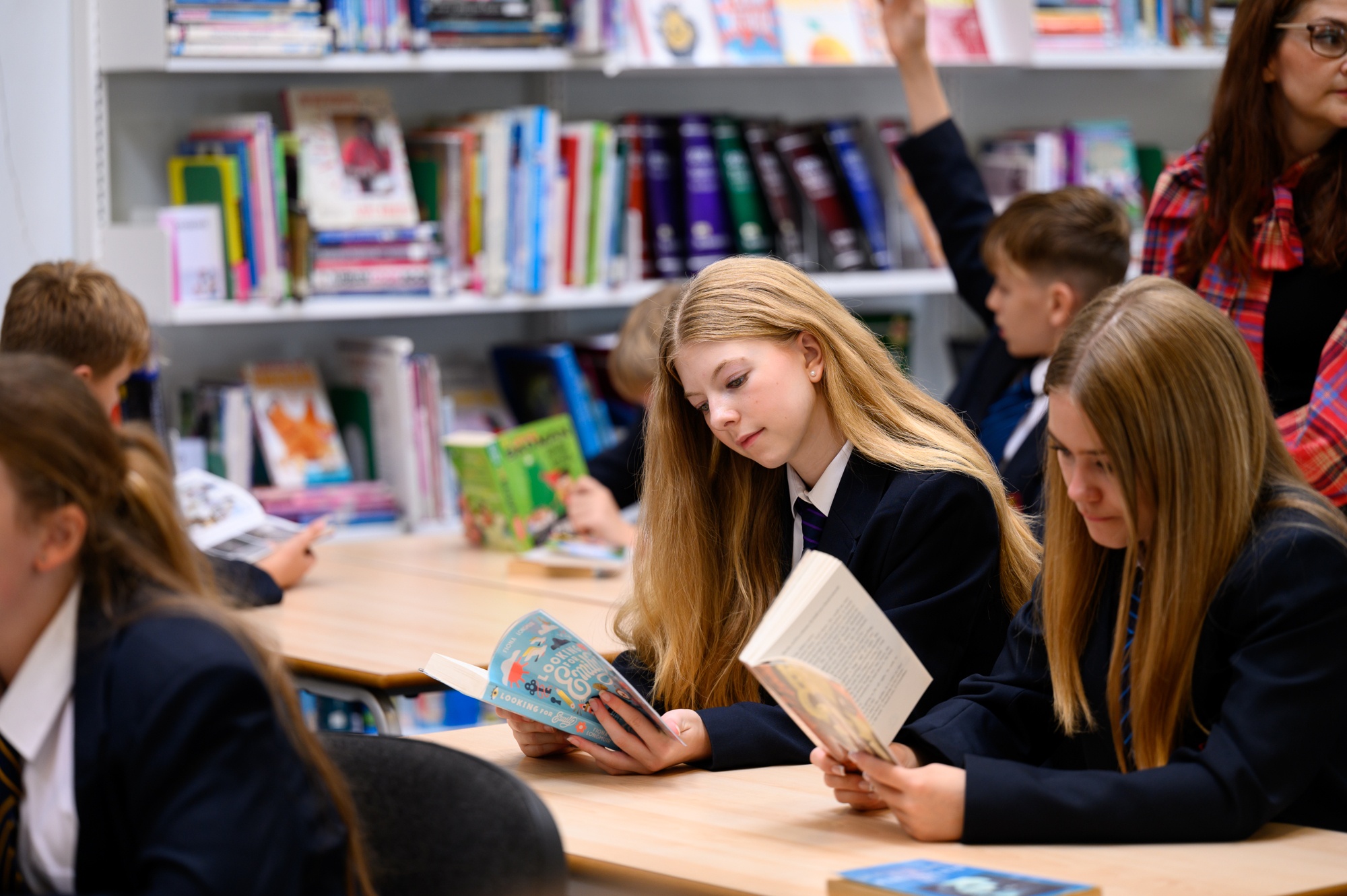English
Contents: (click to view)
Key Stage 4 Revision Documents

Key Stage 3 Curriculum
Year 7
In year 7 students study language and literature change in Britain, from the earliest settlers who put words in our mouths to the Modernist writers who captured the essence of a fractured 20th century Britain. By studying this timeline and understanding the linguistic, literary, social and political changes that took place, students are able to draw on this knowledge in their future studies and understand the world they inhabit. Authors, books, poems and plays can be situated in time and place. Students in year 7 also read a full modern text ‘Tyger’ by S.F. Said and study 'The Hound of the Baskervilles' a detective genre novel written by Sir Arthur Conan Doyle. This novel allows them to understand and replicate features of detective fiction in their own writing.
Year 8
In year 8 students study three full texts including a Shakespeare play, a dystopian novel and modern novel, as well as a selection of poetry that explores different identities and perspectives. The emphasis in year 8 is on developing students' rhetorical writing - sharing their opinions in writing with articulation and skill. We draw on Greek expertise to teach rhetoric. The texts we read highlight important and complex themes such as liberty, restriction, segregation, friendship, honesty and autonomy.
Year 9
In year 9 students have the opportunity to consolidate and develop the skills they learnt in years 7 and 8 in terms of literary analysis and rhetorical writing. They develop their understanding of different types of restriction and alternative meanings of autonomy through the texts we study. They begin with Animal Farm, covering the historical and allegorical context and writing a speech; next they study the poems of four war poets including Wilfred Owen and compare the language used to create visceral responses in the reader; after war poetry they continue with the tragic theme by reading Macbeth, but identify the difference in his tragic hero status in comparison to traditional heroes at war. We draw on Greek theatre when studying his fascinating character. Students also study Gothic Fiction, sampling various Gothic short stories and extracts and giving them the opportunity to craft their own writing using Gothic tropes and features. We believe that the work completed in year 9 prepares students for their GCSE course as it exposes them to more complex texts which challenge and equip them with the creative and analytical skills that are required to succeed at the highest level.
Public Speaking
We are very proud of our tradition of developing students' public speaking skills. Every year since 2009 the school has held a competition for all year groups which challenges them to speak on a specified topic for three minutes in front of a public audience. Students compete in heats and the enthusiasm and camaraderie shown is always spectacular. We believe strongly in creating an environment in which students feel confident and comfortable in sharing their viewpoints.
The Importance of Reading
We cover a range of literature texts across key stage 3 that help students to see great descriptions, characters, plots and structures. Students also access poetry and non-fiction articles as well as speeches, plays and multi-media presentations and interpretations of the texts that they study. This helps to support and strengthen the reading of these central texts even further. An essential requirement for success in English is the development of positive reading habits, and by sharing our own passions with students we hope to foster those habits.
Students across years 7, 8 and 9 are encouraged to read widely and independently for enjoyment. Reading time is a core part of English lessons and is celebrated in the department as a time in which students are engaged in stories.
We are very lucky to have a fantastic librarian, Mrs. Lester, who engages with students in her very busy library and is able to turn around even the most reluctant reader. Mrs. Lester regularly organises author visits and workshops, creative writing club, poetry performances and Poetry by Heart Club where students learn and perform poetry as part of the national competition.
Key Stage 4 - Revision Documents
In year 10 and 11 students complete two GCSEs - AQA English Language and AQA English Literature.
Our English Department has study resources, quizzes, revision materials, knowledge organisers and links to other resources available on students’ Google Classrooms.
We study GCSE Literature texts in years 9 and 10. These consist of the following:
- Macbeth by William Shakespeare,
- A Christmas Carol by Charles Dickens,
- An Inspector Calls by J. B. Priestley,
- AQA Power and Conflict Poetry Anthology,
- Unseen poetry.
In Years 10 and 11 we also use the analytical skills gained in years of previous study to analyse and critique writing. Students look at extracts taken from both fiction and non-fiction and discuss language and structure as devices to impact, persuade, inform and educate. Students also need to replicate these skills in their own writing, as preparation for their AQA GCSE English Language qualification.
For more information, study guides, and revision documents, please see below.
Core Knowledge for Key Stage 3
KS3 core knowledge: terminology for poetry and rhetoric
KS3 core knowledge: spelling, punctuation and grammar
Social Media
YouTube https://www.youtube.com/channel/UCB4BeTEeXUieqFaQr_wL-oA
